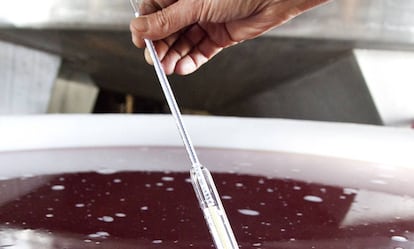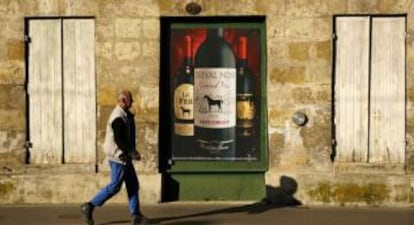The cheap Spanish wine that was being passed off as French
French investigators target suspects who misled consumers into thinking their rosé was made locally

They call it francisé wine, and many consumers drink it at bistrots in the belief that it is a house wine or an inexpensive local product bought at a nearby supermarket. In reality it is Spanish wine that seems French due to the use of deliberately misleading labels or fraudulent practices.
The fraud department at France’s Economy Ministry this week unveiled the results of a two-year investigation that could lead to criminal penalties for the companies and individuals involved in the scheme, all of whom are French.
The tension was reminiscent of the iconic protests by French farmers in the 1980s
Millions of bottles of Spanish rosé wine were being sold at French establishments under the label “Vin de France” or with an Indication Géographique Protégée, a quality designation for products whose reputation is linked to a specific location.
In some cases, the real origin of the wine was difficult to ascertain because of the small print located on the back label, whereas the front label featured symbols typically associated with France, such as a fleur-de-lys or a castle. In some cases the labels said “bottled in France,” which does not mean it is a product of France.
The individuals who engaged in these practices could face prison terms of up to two years and €300,000 in fines, depending on the company’s earnings from this source. The cases have been referred to the courts.

The consumer, competition and fraud department, known as DGCCRF by its French acronym, also found that Spanish wines were being displayed in the “Vins de pays” or local wines section at French supermarkets. Meanwhile, some restaurants and cafés listed Spanish wines on their menu as house wines or local harvests.
Alexandre Chevallier, an official at the DGCCRF, said that the case involves over 70,000 hectoliters of wine, the equivalent of 10 million bottles, the French daily Le Parisien reported. Spain is the global leader in wine exports with nearly five million hectoliters sold annually to France. The alleged fraud affects just 1.4 percent of that amount. “It is a very limited portion of imports. What the investigation concluded is that rules are mostly being respected and the labeling is correct,” said Chevallier.
The case of the francisé wine takes on political overtones in a country where national identity is strongly associated with local growers and terroir products.
The individuals who engaged in these practices could face prison terms of up to two years and €300,000 in fines
“The fraud hurts France and Spain, and also French consumers,” said Guilhem Vigroux, president of the FDSEA union in the Hérault département in southern France. “And then there is the issue of unfair competition within the EU. We don’t have the same weapons. If things continue this way, our production will be destabilized, as witnessed with fruits and vegetables.”
The investigation was launched following a complaint by French producers who were seeing Spanish wine flooding the market. One hectoliter of French rosé has been twice as expensive as its Spanish counterpart in recent years.
“Wines from Spain are being offered at very low prices. We make a profit starting at €78 per hectoliter, while in Spain the threshold is €30 per hectoliter. It is unsustainable,” said Frédéric Rouanet, president of the winemakers union of the Aude département in southern France, in statements to La Dépêche du Midi a year ago.
The tension was reminiscent of the iconic protests by French farmers in the 1980s, when Spanish fruit and vegetables began entering the common market and sometimes ended up squashed on the road. In 2016 and 2017, trucks carrying Spanish wine into France were attacked, and bottles were destroyed in supermarkets.
In 2017, the governments of France and Spain launched a joint committee made up of industry representatives and officials from both countries in order to defuse the situation. The fact that last year’s grape harvest has been smaller, bringing Spanish wine prices closer to the French, has also helped.
English version by Susana Urra.
Tu suscripción se está usando en otro dispositivo
¿Quieres añadir otro usuario a tu suscripción?
Si continúas leyendo en este dispositivo, no se podrá leer en el otro.
FlechaTu suscripción se está usando en otro dispositivo y solo puedes acceder a EL PAÍS desde un dispositivo a la vez.
Si quieres compartir tu cuenta, cambia tu suscripción a la modalidad Premium, así podrás añadir otro usuario. Cada uno accederá con su propia cuenta de email, lo que os permitirá personalizar vuestra experiencia en EL PAÍS.
¿Tienes una suscripción de empresa? Accede aquí para contratar más cuentas.
En el caso de no saber quién está usando tu cuenta, te recomendamos cambiar tu contraseña aquí.
Si decides continuar compartiendo tu cuenta, este mensaje se mostrará en tu dispositivo y en el de la otra persona que está usando tu cuenta de forma indefinida, afectando a tu experiencia de lectura. Puedes consultar aquí los términos y condiciones de la suscripción digital.









































